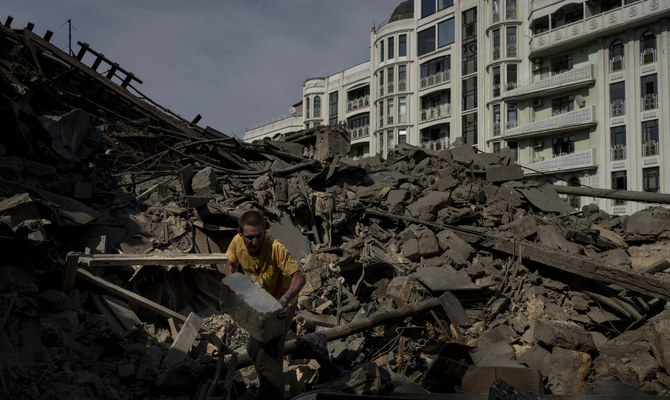UNITED NATIONS: In an escalation of Russia’s anger at Ukraine and its Western backers, Russia refused to speak at a UN Security Council meeting called to discuss Moscow’s recent devastating attacks on the key port of Odesa immediately following its refusal to extend the Black Sea grain deal.
The confrontation began at the start of a council session called by Russia on the divided Orthodox Church in Ukraine. Russia’s deputy UN ambassador, Dmitry Polyansky, protested that Britain, which holds the council presidency, was allowing only two briefers and Moscow wanted a third — Archbishop Gideon of the Ukrainian Orthodox Church.
The Ukrainian government has cracked down on the Ukrainian Orthodox Church over its historic ties to the Russian Orthodox Church, whose leader, Patriarch Kirill, supported Russian President Vladimir Putin over the invasion of Ukraine.
Polyansky accused the UK of bias, censorship and obstruction for limiting the number of briefers.
Deputy British ambassador James Kariuki responded that because of a tight time schedule to fit in two council meetings, the UK had offered a compromise to allow a third Russian briefer to submit a statement to the council, which he said was “not unreasonable.”
Polyansky was not satisfied, and Kariuki then put Russia’s proposal to have the archbishop speak to a vote. Russia got support only from China and Brazil, with the 12 other council members abstaining.
Polyansky called the council’s refusal to allow the archbishop to speak an “egregious” example of double standards on human rights and freedom of religion.
As “a sign of protest,” he said, Russia wouldn’t speak in the Ukraine-backed council session called by Ukraine to take up the Odesa attacks.
The meeting on the Orthodox Church then went ahead. The director of the UN Alliance of Civilizations, Nihal Saad, told the council that the division between Ukraine’s Orthodox bodies “has existed for decades.” But she said it has been exacerbated since the February 2022 Russian invasion and has “reverberated worldwide as Orthodox churches have struggled with how and whether to take sides.”
Saad said the “heartbreaking” damage to Odesa’s historic church, the Transfiguration Cathedral, caused by a Russian missile strike Sunday was condemned by many, including the UN secretary-general. The cathedral is in Odesa’s historic city center that is a UNESCO world heritage site and had been largely spared since the beginning of the war.
Saad lamented that it was one of 116 religious sites damaged since the invasion, according to a preliminary assessment by the UN Educational, Scientific and Cultural Organization.
In her briefing, Saad cited restrictions to freedom of religion by both Russia and Ukraine since the invasion, saying “the politicization of religion in the war in Ukraine fuels intercommunal tensions, stokes fear and triggers violence.”
Polyansky called the devastation to the cathedral “a horrible tragedy” and reiterated Russia’s claim that the cathedral was damaged by a piece from Ukraine’s anti-air defenses — not a Russian missile. If a Russian missile targeted the cathedral, he said, “then there would be nothing left of the cathedral at all.”
The Russian deputy ambassador left the council chamber at the end of the session.
The council meeting that followed on the Russian attacks on Odesa came days after President Vladimir Putin pulled Russia out of the Black Sea Grain Initiative, a wartime deal that enabled Ukraine to export more than 32,000 tons of foodstuff to many countries facing the threat of hunger.
In addition to severely damaging the cathedral, the Russian attacks crippled significant parts of export facilities in Odesa and nearby Chornomorsk, and destroyed 60,000 tons of grain, according to Ukraine’s Agriculture Ministry.
The council heard from 14 members, almost all condemning the damage to Odesa.
US Ambassador Linda Thomas-Greenfield said that “Russia is hell-bent on preventing Ukrainian grain from reaching global markets” and that “the world is paying the price for Russia’s barbaric attacks.”
She accused Russia of “weaponizing grain” and cynically using Russian-produced grain as leverage to win the support of other countries.
Ukrainian Ambassador Sergiy Kyslytsya, the last speaker, told the council that Russian missiles, including anti-ship missiles, hit 29 historical and cultural landmarks in Odesa.
He said Russia’s blockade of Ukrainian ports, destruction of their infrastructure, obstruction of grain exports, and intimidation of foreign merchant vessels should be considered an attack on freedom of navigation.
“These actions also aim at eliminating a market competitor, deliberately raising world food prices and making a profit at the expense of the millions of people around the world who will suffer,” Kyslytsya said.
A junior Russian diplomat sat in Russia’s chair during the Odesa session and left the chamber when it ended — never having uttered a word.


Angry Russia refuses to speak at UN meeting on its attacks on Ukraine’s key port city of Odesa
Short Url
https://arab.news/54c6h
Angry Russia refuses to speak at UN meeting on its attacks on Ukraine’s key port city of Odesa

- The confrontation began at the start of a council session called by Russia on the divided Orthodox Church in Ukraine
Kyiv metro temporarily closes due to power shortage

- Closure amid a spurt of Russian attacks on Ukrainian energy infrastructure
KYIV: Kyiv’s metro system temporarily closed on Saturday due to power shortages, the operator said, amid a spurt of Russian attacks on Ukrainian energy infrastructure.
“Due to a power outage from external power supply centers, train service and escalator operation have been temporarily suspended in the metro,” Kyiv Metro said in a post on Facebook.
“Due to a power outage from external power supply centers, train service and escalator operation have been temporarily suspended in the metro,” Kyiv Metro said in a post on Facebook.
© 2026 SAUDI RESEARCH & PUBLISHING COMPANY, All Rights Reserved And subject to Terms of Use Agreement.












